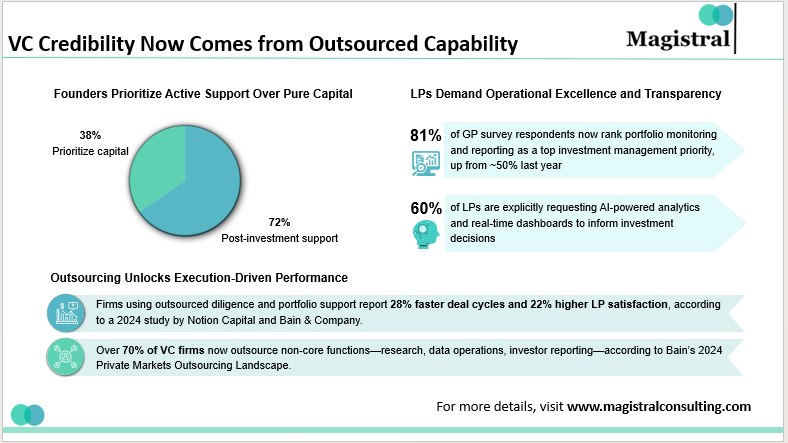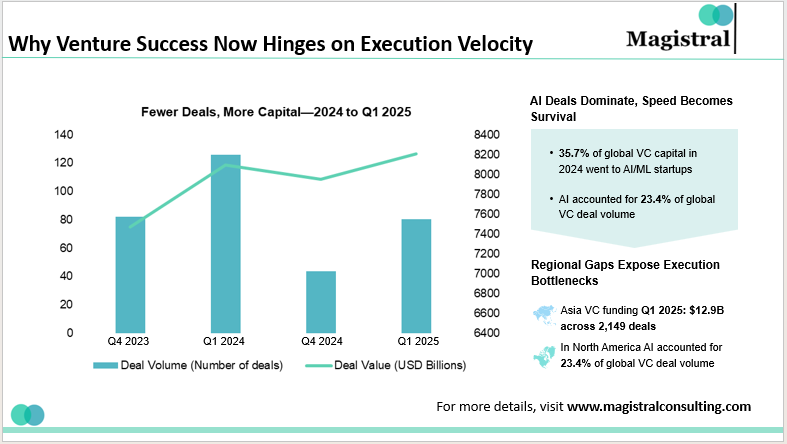To match the high-velocity innovations in the economy, venture capital is emerging as a strategic lever, other than being a funding mechanism. As ventures are becoming a runway for founders to scale, for investors, it’s a tool to back breakthrough ideas. Venture Capital is a multi-layered partnership that shapes the company’s growth, governance, and eventual outcome. Dealing in venture capital requires an understanding of its nuances, which are essential for the stakeholders. As Venture Capital is often considered a “risky capital,” its institutional-building capital capacity can never go unseen. As its complexity is taking a rise, venture capital outsourcing practices of delegating non-core but critical functions are taking a parallel rise to help the internal management specialize.

VC Credibility Now Comes from Outsourced Capability
Venture Capital Is No Longer Just About Access—It’s About Systemic Throughput
As access to capital is becoming democratized, syndicates, operator angels, rolling funds, and general partners are blurring the line of entry. But all this comes with a bottleneck of execution capacity. Now, the real deal is all about how deals are getting screened, the due diligence process, and precise decisions in support and exit.
The most scalable venture capital is not just better with deal flows but also has organized pipelines and post-deployment workflows. Venture capital outsourcing acts as a real differentiator for the firms to stand out and make all the actions tailored to the customized requirements of the interest holders.
Given the scenarios, venture capital outsourcing is not all about lowering the cost scheme, but it’s becoming a point of competitive advantage, as beneath the surface, pitch decks and partners connect, a quiet yet bold shift is taking place where the most effective firms are functioning less like boutique investors and more like modular engines of execution.
From Signal to Throughput: A Structural Shift
The success of modern ventures hinges on the ability of the funds to handle the volume, complexity, and velocity not just in spotting the signals, but also in processing the pipeline with discipline and repeatability. Ventures lacking a throughput mindset often default to reactive behavior, suffering from delays in evaluation, vague feedback to founders, or missed timelines on follow-ups. Venture capital outsourcing allows the firms to have a running structure for deal evaluation at a standardized speed, giving a plug-and-play execution partner support for the portfolio companies, and preparing companies for next round readiness and early-stage exit planning, giving them a disciplined layer that keeps deal pipelines fluid and responsive.

Why Venture Success Now Hinges on Execution Velocity
From Capital to Capability: What Stakeholders Actually Value Now
Valuing the real game now, limited partners and founders are looking for funds that hold the capabilities over the write checks. According to Carta’s 2024 founder survey, 72% of founders say post-investment value add is a top factor in choosing investors, while 38% readily defined capital as a sole factor.
Differentiating from the founders, limited partners’ expectations have grown even sharper. A recent Preqin report found that over 60% of limited partners now evaluate venture capital firms based on their reporting frequency, transparency, and operational infrastructure, and not based on IRR.
The trends reveal a shift from capital-as-scarcity to capital-as-strategy. To tap most of its value, venture capital outsourcing is investing its focus and funds more to build a flexible and scalable support layer for acting faster and better, with consistent, reliable services.
The Next Frontier of Venture Capital Performance: Throughput Over Prestige
As the mastheads are losing their importance for valuation, prestige no longer closes deals or guarantees outcomes. According to the Notion Capital 2024 survey, 68% of founders said they would choose a “process-driven, hands-on fund” over a well-known brand if the former could move faster and offer more structured post-investment support. Moreover, Brian’s 2025 Global Private Equity Report highlighted that funds with “institutionalized systems”-including external research, portfolio support, and investor reporting- outperformed peer funds by up to 20% in both deal velocity and exit speed.
As the market is getting tougher, the buyout deal values are squeezing, and the median distribution is falling to just 11% of NAV, which is the lowest in the decade, indicating that these execution advantages are becoming increasingly decisive.
The data itself explains why venture capital outsourcing is becoming a true differentiator. The modular infrastructure, such as the sector-specific diligence, on-demand GTM teams, CRM automation, and outsourced IR, allows the firms to execute like institutions, even when they’re small.
The Shift from Deal Access to Deal Conversion Is Already Underway
Given the venture landscape, sell-downs and branding alone won’t drive results; it requires the ability to execute something that makes a difference. According to KPMG’s Q1 2025 Venture Pulse, global venture capital funding surged to $126.3 billion, but deal volume dropped to just 7,551 deals, marking the lowest in the decade. Looking at this divergence, venture capital outsourcing underscores a central truth that capital size concentrates some mega-deals, but the consistent performance depends on the throughput and not on the access to capital factor.
As the data-driven world is blooming, venture capitalists are strategizing to reshape their field. According to a generic survey, 60% of the venture capital is now regularizing the use of AI-powered tools. Coupling up with venture capital outsourcing experts and AI-powered tools, they are strategically shortening due diligence timelines by as much as 35%. Funds leveraging these tools are executing more swiftly, especially when layered with modular outsourcing—such as external research or portfolio support teams—and outpacing peers in deal velocity and follow-on participation.
A recent report by Nimbus Synergies in Q1 2025 revealed the picture of competitive advantage as the deal count moved by just 11% quarter-over-quarter, the total capital in North America rose by 19% largely driven by mega-deals. Marking is a no macro-outlier but a signal that funds with robust execution engines can consistently participate in high-growth opportunities, even in uncertain markets.
Visioning the throughput is to build a smart system, making it tech-enabled and backed by a solid and experienced venture capital outsourcing mechanism. The firms that win aren’t the headline names—but the ones operating with institutional discipline at scale, using lean frameworks to deliver decisive speed, strategic follow-through, and operational clarity.
Why the Next Great Venture Firm Might Not Look Like One at All
The most disruptive firms emerging today don’t resemble the traditional image of elite partnerships housed in tower glasses. According to the data in Pitchbook’s Q1 2025 Emerging Managers report, reveals that nearly 47% of the new venture capital firms launched in the past two years have fewer than five full-time investment professionals, yet many of them deploy capital at a pace comparable to legacy firms.
Venture Capital outsourcing are enabling them to run more deals, make decisions faster and offer consistent founder and LP engagement—without ballooning overhead, as revealed in the recent report of Bain & Company’s 2025 Global Private Equity Outlook found that funds leveraging outsourced operations experienced 32% faster diligence cycles and 28% higher follow-on participation rates, particularly when combining outsourcing with automation or AI support.
In the understanding of this new paradigm, venture capital outsourcing is not just a cost-effective tool but also a powerful weapon to act across borders and sectors. The next iconic venture firm may not look like one at all—but it will execute like the best of them.
About Magistral Consulting
Magistral Consulting has helped multiple funds and companies in outsourcing operations activities. It has service offerings for Private Equity, Venture Capital, Family Offices, Investment Banks, Asset Managers, Hedge Funds, Financial Consultants, Real Estate, REITs, RE funds, Corporates, and Portfolio companies. Its functional expertise is around Deal origination, Deal Execution, Due Diligence, Financial Modelling, Portfolio Management, and Equity Research
For setting up an appointment with a Magistral representative visit www.magistralconsulting.com/contact
About the Author

Prabhash Choudhary is the CEO of Magistral Consulting. He is a Stanford Seed alumnus and mechanical engineer with 20 + years’ leadership at Fortune 500 firms- Accenture Strategy, Deloitte, News Corp, and S&P Global. At Magistral Consulting, he directs global operations and has delivered over $3.5 billion in client impact across finance, research, analytics, and outsourcing. His expertise spans management consulting, investment and strategic research, and operational excellence for 1,200 + clients worldwide

